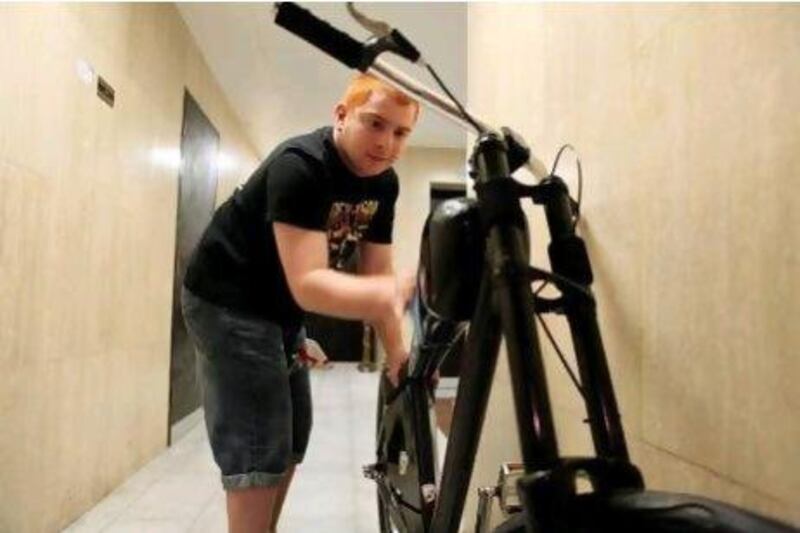ABU DHABI // Hasan Al Mofti is a laugh-a-minute joker with bright red hair and a huge, infectious smile.
He would like to be a firefighter someday, or maybe work with animals.
And he loves his “motorcycle” - a black bicycle styled like a Harley-Davidson - with complete devotion.
Cruising in the hallway of his Khalidiya apartment building on Monday, he hummed a resounding “Vrooooom!”
But since his Iraqi family moved here from New Zealand two years ago, Mr Al Mofti, 23, has found few outlets for his gregarious personality.
Developmentally delayed, he made friends easily in New Zealand, where he belonged to a social group for young adults like him.
Now he feels isolated.
“Here I can’t do anything,” he said.
Most days Mr Al Mofti stays in his apartment waiting for his mother, Fay Al Mofti - a shadow teacher for a special needs girl - to come home. Often he watches television. Sometimes he rides his bicycle inside. His mother ruefully pointed out scuff marks on the floor.
Mr Al Mofti spent his early years in Iraq. His family moved to New Zealand when he was six years old.
“I loved it so much,” he said. “My friends were there, my schools, the programmes, swimming, sports.”
They left after the financial crisis, settling in Jordan for eight months before coming to Abu Dhabi.
“Until we left, his life was full of activities, full of friends,” his mother said.
Some people with disabilities fall through the cracks when they turn 18, said Eman Gaad, a special education expert and dean of the faculty of education at The British University in Dubai.
“For the younger kids, I think we have solved the problem to some extent,” she said.
But there is still “room for improvement” for adults, who often have little to do, Dr Gaad said.
“They will be stuck with the family to look after them, or maybe being home all the time,” she said. “Or they tend to rely on video games and spend hours with machines.”
Mr Al Mofti wishes he had a social group here. His mother and a friend - Jenna Bolduc, a special education teacher - are trying to create one, but have had trouble finding participants.
Kathleen Austrin, an advisor at the Zayed Higher Organization for Humanitarian Care and Special Needs, said the Abu Dhabi agency has activities Hasan could join.
“We have sports clubs and performing arts, drama, music, therapy and things like this,” she said. “They’re open to non-locals.”
Still, Mrs Al Mofti said it has been difficult to find opportunities.
Once she thought she found a volunteer position for her son, but it fell through. Another time, a job fair recruiter told her he could accommodate employees with physical disabilities but was not ready for people like her son.
Mr Al Mofti makes do. He is the kind of man who can easily make himself laugh. People in the neighbourhood are drawn to him and his unusual bicycle.
“When I go outside, people come and take photos with it,” he said.
He also spends time with Ms Bolduc, 25, from the United States. They have bicycled along the Corniche and gone bowling.
“He’s just itching for some friends,” she said.
“Young people need young people...” Dr Gaad said. “The only way to have a normal life is to belong to a societal group where your needs are respected and you’re taken for who you are.”
"This is one of the most important reasons that these kids improve and
have confidence," Mrs Al Mofti said.
Ms Bolduc said she envisioned the group she is trying to create as a safe environment for people with mild to moderate cognitive or physical disabilities. They could visit parks, organise themed dinners or watch movies.
“There’s got to be more people out there looking,” she said.
For now, Mr Al Mofti is anticipating his next outing with Ms Bolduc.
“How many times have I asked you to go swimming?” he chided her on Monday.
Soon, she said.
“Really?” he asked, grinning. “Thank God! When?”






